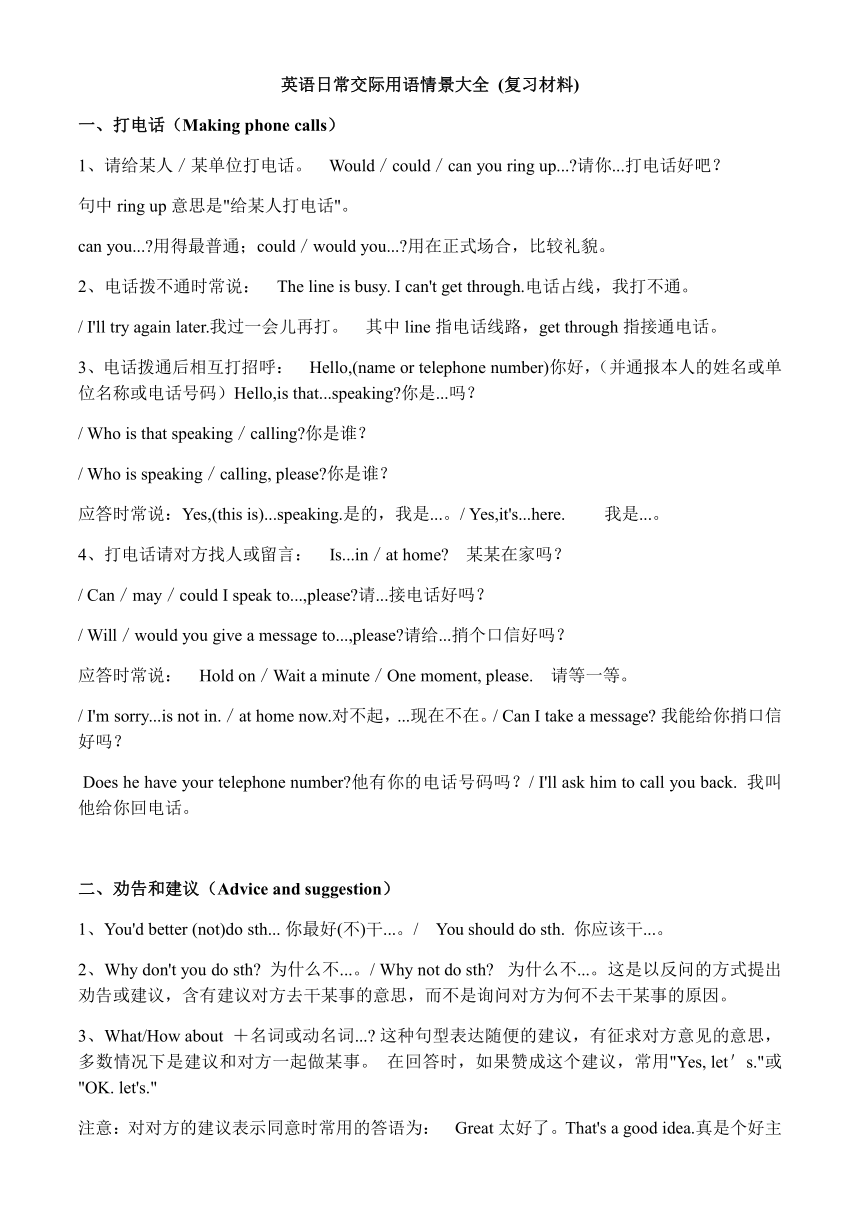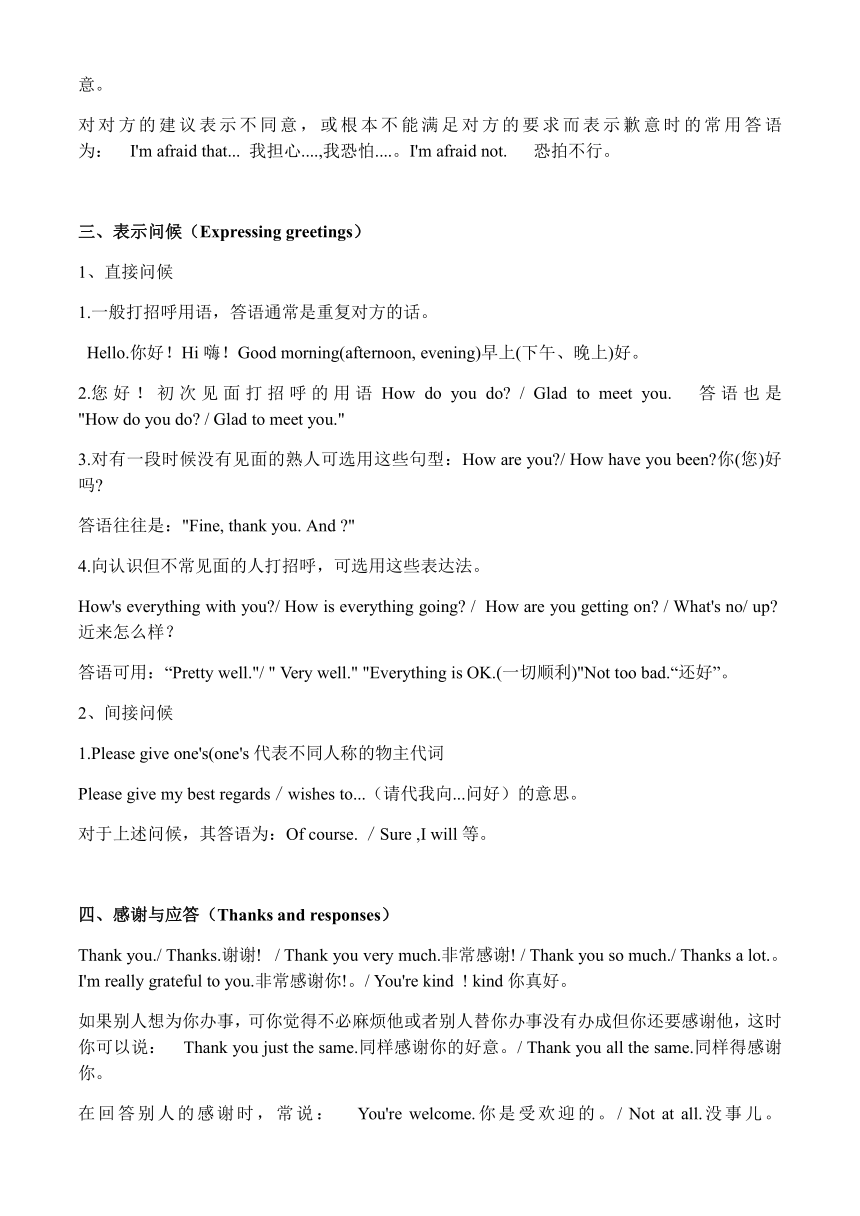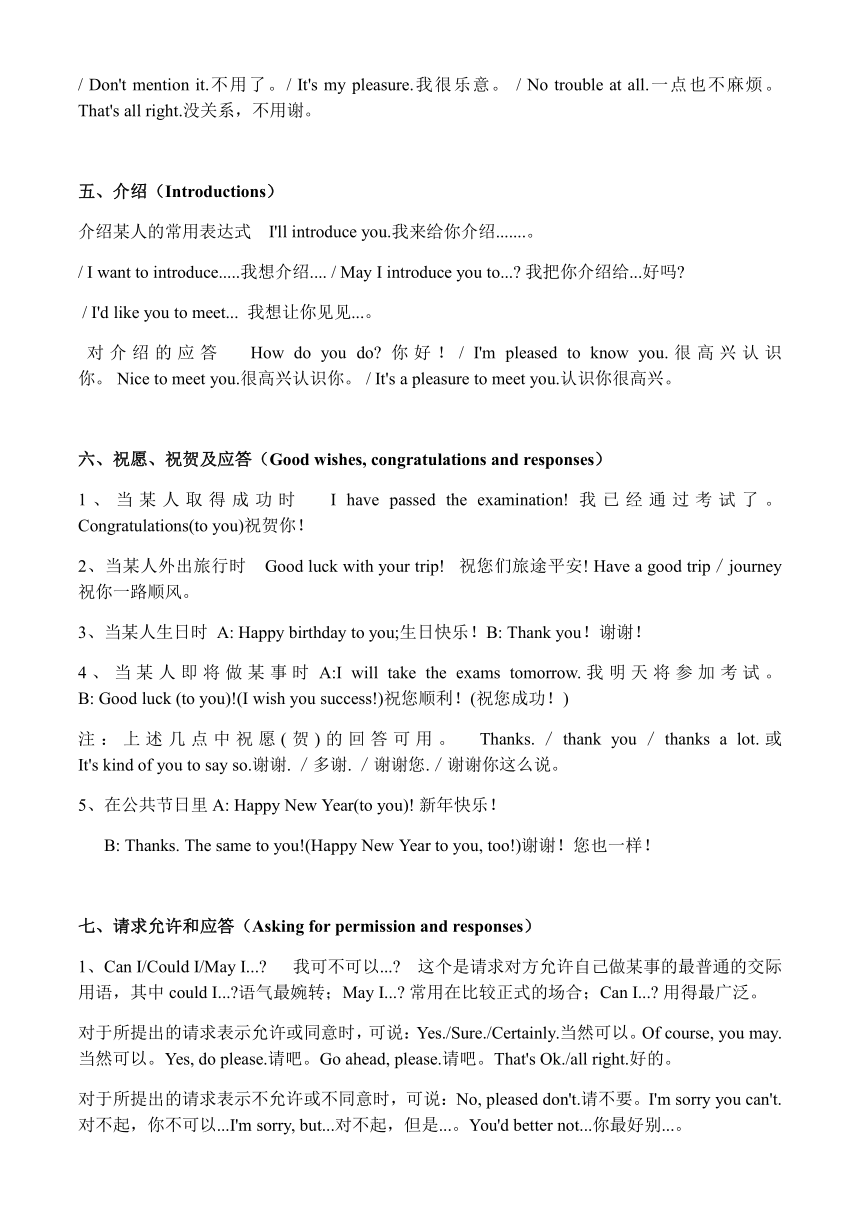2023届广东省春季高考英语情景交际复习讲义
文档属性
| 名称 | 2023届广东省春季高考英语情景交际复习讲义 |

|
|
| 格式 | docx | ||
| 文件大小 | 29.7KB | ||
| 资源类型 | 教案 | ||
| 版本资源 | 通用版 | ||
| 科目 | 英语 | ||
| 更新时间 | 2022-10-24 00:00:00 | ||
图片预览



文档简介
英语日常交际用语情景大全 (复习材料)
一、打电话(Making phone calls)
1、请给某人/某单位打电话。 Would/could/can you ring up... 请你...打电话好吧?
句中ring up意思是"给某人打电话"。
can you... 用得最普通;could/would you... 用在正式场合,比较礼貌。
电话拨不通时常说: The line is busy. I can't get through.电话占线,我打不通。
/ I'll try again later.我过一会儿再打。 其中line指电话线路,get through 指接通电话。
3、电话拨通后相互打招呼: Hello,(name or telephone number)你好,(并通报本人的姓名或单位名称或电话号码)Hello,is that...speaking 你是...吗?
/ Who is that speaking/calling 你是谁?
/ Who is speaking/calling, please 你是谁?
应答时常说:Yes,(this is)...speaking.是的,我是...。/ Yes,it's...here. 我是...。
4、打电话请对方找人或留言: Is...in/at home 某某在家吗?
/ Can/may/could I speak to...,please 请...接电话好吗?
/ Will/would you give a message to...,please 请给...捎个口信好吗?
应答时常说: Hold on/Wait a minute/One moment, please. 请等一等。
/ I'm sorry...is not in./at home now.对不起,...现在不在。/ Can I take a message 我能给你捎口信好吗?
Does he have your telephone number 他有你的电话号码吗?/ I'll ask him to call you back. 我叫他给你回电话。
二、劝告和建议(Advice and suggestion)
1、You'd better (not)do sth... 你最好(不)干...。/ You should do sth. 你应该干...。
2、Why don't you do sth 为什么不...。/ Why not do sth 为什么不...。这是以反问的方式提出劝告或建议,含有建议对方去干某事的意思,而不是询问对方为何不去干某事的原因。
3、What/How about +名词或动名词... 这种句型表达随便的建议,有征求对方意见的意思,多数情况下是建议和对方一起做某事。 在回答时,如果赞成这个建议,常用"Yes, let's."或"OK. let's."
注意:对对方的建议表示同意时常用的答语为: Great太好了。That's a good idea.真是个好主意。
对对方的建议表示不同意,或根本不能满足对方的要求而表示歉意时的常用答语为: I'm afraid that... 我担心....,我恐怕....。I'm afraid not. 恐拍不行。
三、表示问候(Expressing greetings)
1、直接问候
1.一般打招呼用语,答语通常是重复对方的话。
Hello.你好!Hi嗨!Good morning(afternoon, evening)早上(下午、晚上)好。
您好!初次见面打招呼的用语How do you do / Glad to meet you. 答语也是"How do you do / Glad to meet you."
对有一段时候没有见面的熟人可选用这些句型:How are you / How have you been 你(您)好吗
答语往往是:"Fine, thank you. And "
4.向认识但不常见面的人打招呼,可选用这些表达法。
How's everything with you / How is everything going / How are you getting on / What's no/ up 近来怎么样?
答语可用:“Pretty well."/ " Very well." "Everything is OK.(一切顺利)"Not too bad.“还好”。
2、间接问候
1.Please give one's(one's 代表不同人称的物主代词
Please give my best regards/wishes to...(请代我向...问好)的意思。
对于上述问候,其答语为:Of course. /Sure ,I will等。
四、感谢与应答(Thanks and responses)
Thank you./ Thanks.谢谢! / Thank you very much.非常感谢! / Thank you so much./ Thanks a lot.。I'm really grateful to you.非常感谢你!。/ You're kind ! kind 你真好。
如果别人想为你办事,可你觉得不必麻烦他或者别人替你办事没有办成但你还要感谢他,这时你可以说: Thank you just the same.同样感谢你的好意。/ Thank you all the same.同样得感谢你。
在回答别人的感谢时,常说: You're welcome.你是受欢迎的。/ Not at all.没事儿。/ Don't mention it.不用了。/ It's my pleasure.我很乐意。 / No trouble at all.一点也不麻烦。That's all right.没关系,不用谢。
五、介绍(Introductions)
介绍某人的常用表达式 I'll introduce you.我来给你介绍.......。
/ I want to introduce.....我想介绍.... / May I introduce you to... 我把你介绍给...好吗
/ I'd like you to meet... 我想让你见见...。
对介绍的应答 How do you do 你好!/ I'm pleased to know you.很高兴认识你。 Nice to meet you.很高兴认识你。 / It's a pleasure to meet you.认识你很高兴。
六、祝愿、祝贺及应答(Good wishes, congratulations and responses)
1、当某人取得成功时 I have passed the examination! 我已经通过考试了。 Congratulations(to you)祝贺你!
2、当某人外出旅行时 Good luck with your trip! 祝您们旅途平安! Have a good trip/journey祝你一路顺风。
3、当某人生日时 A: Happy birthday to you;生日快乐!B: Thank you!谢谢!
4、当某人即将做某事时A:I will take the exams tomorrow.我明天将参加考试。B: Good luck (to you)!(I wish you success!)祝您顺利!(祝您成功!)
注:上述几点中祝愿(贺)的回答可用。 Thanks./thank you/thanks a lot.或It's kind of you to say so.谢谢. /多谢. /谢谢您./谢谢你这么说。
在公共节日里A: Happy New Year(to you)! 新年快乐!
B: Thanks. The same to you!(Happy New Year to you, too!)谢谢!您也一样!
七、请求允许和应答(Asking for permission and responses)
1、Can I/Could I/May I... 我可不可以... 这个是请求对方允许自己做某事的最普通的交际用语,其中could I... 语气最婉转;May I... 常用在比较正式的场合;Can I... 用得最广泛。
对于所提出的请求表示允许或同意时,可说:Yes./Sure./Certainly.当然可以。Of course, you may.当然可以。Yes, do please.请吧。Go ahead, please.请吧。That's Ok./all right.好的。
对于所提出的请求表示不允许或不同意时,可说:No, pleased don't.请不要。I'm sorry you can't.对不起,你不可以...I'm sorry, but...对不起,但是...。You'd better not...你最好别...。
2、Do you mind if I do... 这是用来表示“请求许可”的交际用语。句中的mind作“介意”、“反对”解。整句的意思是“如果我干某事,你反对/介意吗 ”或“我干某事,”好吗
应答时,如果表示“允许/不介意”,常说:No, I don't mind. 我不介意/我允许。Certainly not / Of course not. 当然不介意。
如果表示“不允许/介意”时,常说:I'm sorry you can't...很抱歉,你不能...。I'm afraid....恐怕....I'm afraid it's not allowed. 恐怕这是不允许的。
3、I wonder if I could/can... 我想知道我能否...
应答时,如果允许,常说:Sure, go ahead./Yes, please do.可以,请吧。 Yes./Of course./Certainly. 当然可以。
如果不允许,可以说: I'm sorry, but... 对不起,...I'm afraid not. 恐怕不行。No, please don't. 请不要......。You'd better not... 你最好别....。
八、请求(Requests)
1、用may(can, could),来表达。
表示同意请求的应答:yes ,you may(can).是的。/certainly.(=of course./Sure.)当然可以。/Yes, do please,好的,请吧。
表示不同意请求的应答:No, you mustn't,不可以。/No, you can't,不能。No, you'd better not你最好不这样。/Please don't 请不要这样。
3、用Would, Will, Would(Will)you please... /Would you like... 来表达。 表示同意请求的应答:Yes, I'd like to.(=Yes, I'd love to.=Yes, I'll be glad to.=)是的,我愿意。/With pleasure.十分愿意。
九、道歉和应答(Apologize and responses)
Excuse me for...... 请原谅我....../ Pardon me for....... 请原谅我......./ I'm really sorry for..... / 我真为.......感到抱歉。I'm awfully sorry. I don't mean to...... 我非常抱歉,我无意......
对道歉的反应 It really isn't worth mentioning.实在不值得一提。Don't say more about it.不要再提它了。Never mind, it doesn't really matter.没关系,真的不要紧。That's all right.没关系。
十、邀请与应答(Invitation and responses)
1、用一般疑问句形式 Will / would / can / could you come to... 是被邀请人接受的可能性较大。表示“请您来...好吗 ”。例如: Will you come to take part in my party 你来参加我的聚会好吗 Would you like +名词(代词) / 不定式 / sb.+不定式 此句型表示“您愿意... 或你是否愿意... ”,此时邀请人不知对方是否接受邀请,是商量、询问及试探性的邀请、请求或表示个人的想法、看法。
例如: Would you like to go there with him 你愿意与他一道去那儿吗 B:Yes, I'd like(love) to好的,我愿意。
委婉拒绝表达法B: I'd like(love) to, but I'm very busy.我很想,但我很忙。
十一、提供帮助和应答(Offers and responses)
Can/ could/ Shall I help you (with that) 我可以帮你吗 / Can/ Could/ Shall I do...for you 我可以帮你干...吗 / What can I do for you 我能为你做什么
应答时,不管你需不需要对方的帮助,首先得表示感谢。Thank you./ Thanks a lot/ Thank you very much. 谢谢。
如果需要帮助可以说: Thanks. That's very kind /good / nice (of you). 谢谢,那太好了。
如果谢绝帮助,可以说: No, thanks. I can manage it myself.谢谢,我自己可以对付。
十二、看病时病交际用语
1、医生询问病情时的常用语 What can I do for you" 你看什么病
Is there anything wrong with you 有什么看病吗
2、病人诉说病情时的常用语 I feel terrible/ bad/ ill sick. 我感到很不舒服。
There is something wrong with... 我的...有毛病。 I have / have got.... 我觉得...痛。/ My back / nose hurts / aches. 我的背/鼻子痛。
3、医生给病人检查时的常用语 (Lie down and )let me exam you. (躺下),让我检查一下。
4、医生看完病后对病人提出医嘱时的常用语 It's nothing serious. 病不重。不要紧。/ You'd better have a good rest. 你最好好好休息休息。 Take this medicine three times a day. 这药每天吃三次。
十三、征询
1、What's your opinion 你的看法呢 In my opinion ... 据我看,...
2、Do you think it is... 你可认为...吗 Yes,I think so./ No,I don't think so.是的,我也这样认为。不,我不这样认为。Yes,I agree with you. 是的,我同意你的看法。No,I don't agree with you. 不,我不同意你的看法。
3、What do you think about it 你对这事是怎么看的。 I think / I believe... 你认为....。
4、Would you like+名词或不定式 此句型用来询问别人的愿望的,其答语是I'd like to或I'd love to我愿意
十四 、问路及应答的交际用语
Excuse me. Can you tell me the way to ... 劳驾,请告诉我去.....(地方)怎么走
/ Excuse me. Han can I get to... 问路时,首先说“Excuse me.”意思是“请原谅”、“请问”、“劳驾”,表示因为打扰而道歉,然后再问路,应答时可根据实际情况回答。
常用的有以下几种表达: How far is it from here 它离这里多远 / It's about...meters from here. 它离这里大约...米远。
Go down/along this street. 沿着这条街走下去。/ Take this street/road. 走这条街/大路。
/ You'd better take a taxi/minibus/No. 5 bus...你最好坐出租车/乘小公共汽车 / 乘5路公共汽车。
十五 、就餐时的交际用语
1、就餐时,当主人询问客人想吃/喝点什么时,主人常说: Would you like sth.(to eat / to drink) 你想吃 / 喝点...吗 / What would you like (to have) 你想要吃点什么
2、就餐时,当主人主动请客人吃/喝点东西时,主人常说:Help yourself to... 你吃/喝点...吧。
3、当客人表示愿意或同意吃/喝点东西时,常回答: Yes, please,好的。I'd like...我想来点...。
4、当客人表示不想吃/喝东西或表示已经吃饱/喝好了时,常回答:No, thanks, 谢谢,不要了。
十六、语言困难( Language Difficulties )
当没听清(懂)对方讲话内容时, 用I'm sorry, I didn't quite follow(catch)you.对不起,请再说一遍时,可用下列句型表达:I'm afraid I didn't follow (catch)起,我没有听懂(清)。
十七、询问国籍、籍贯,姓名及职业时的常用语
What's your nationality 你是哪国人 Are you American... 你是美国人吗
/ Are you from American / Britain... 你是美国人/英国人...吗 / Where are you from 你是哪里人 / What country are you from 你是哪个国家的 / What are you 你是干什么的 / Who are you 你是谁 / What's your name 你叫什么名字
十八 、约会的交际用语
1、询问对方是否有空: Will you be free (tonight/ tomorrow/...) 你(今晚/明天 ...)有空吗
肯定回答:Yes, I'll be free (tonight / tomorrow...). 我(今晚/明天...)有空。
否定回答:No,I won't be free(tonight/ tomorrow...).不,(今晚/明天...)没有空。
十九、表示同意和不同意的用语
1、表示同意 Certainly./ Sure./ Of course.当然可以。/ No problem. 没有问题。Yes ,I think so. 是的,我也这样认为。/ I agree with sb. 我同意某人的看法。/ I agree with sb. 我同意某事。I agree that... 我同意.../ Good idea ! / That's a good idea. 好主意。/ It's a good idea to do sth. 干某事是人好主意。
2、表示不同意。 No,I don't think so. 不,我不这样认为。/ I don't agree with sb. 我不同意某人的看法。/ I don't agree to sth. 我不同意某事。/ I don't agree that . 我不同意
一、打电话(Making phone calls)
1、请给某人/某单位打电话。 Would/could/can you ring up... 请你...打电话好吧?
句中ring up意思是"给某人打电话"。
can you... 用得最普通;could/would you... 用在正式场合,比较礼貌。
电话拨不通时常说: The line is busy. I can't get through.电话占线,我打不通。
/ I'll try again later.我过一会儿再打。 其中line指电话线路,get through 指接通电话。
3、电话拨通后相互打招呼: Hello,(name or telephone number)你好,(并通报本人的姓名或单位名称或电话号码)Hello,is that...speaking 你是...吗?
/ Who is that speaking/calling 你是谁?
/ Who is speaking/calling, please 你是谁?
应答时常说:Yes,(this is)...speaking.是的,我是...。/ Yes,it's...here. 我是...。
4、打电话请对方找人或留言: Is...in/at home 某某在家吗?
/ Can/may/could I speak to...,please 请...接电话好吗?
/ Will/would you give a message to...,please 请给...捎个口信好吗?
应答时常说: Hold on/Wait a minute/One moment, please. 请等一等。
/ I'm sorry...is not in./at home now.对不起,...现在不在。/ Can I take a message 我能给你捎口信好吗?
Does he have your telephone number 他有你的电话号码吗?/ I'll ask him to call you back. 我叫他给你回电话。
二、劝告和建议(Advice and suggestion)
1、You'd better (not)do sth... 你最好(不)干...。/ You should do sth. 你应该干...。
2、Why don't you do sth 为什么不...。/ Why not do sth 为什么不...。这是以反问的方式提出劝告或建议,含有建议对方去干某事的意思,而不是询问对方为何不去干某事的原因。
3、What/How about +名词或动名词... 这种句型表达随便的建议,有征求对方意见的意思,多数情况下是建议和对方一起做某事。 在回答时,如果赞成这个建议,常用"Yes, let's."或"OK. let's."
注意:对对方的建议表示同意时常用的答语为: Great太好了。That's a good idea.真是个好主意。
对对方的建议表示不同意,或根本不能满足对方的要求而表示歉意时的常用答语为: I'm afraid that... 我担心....,我恐怕....。I'm afraid not. 恐拍不行。
三、表示问候(Expressing greetings)
1、直接问候
1.一般打招呼用语,答语通常是重复对方的话。
Hello.你好!Hi嗨!Good morning(afternoon, evening)早上(下午、晚上)好。
您好!初次见面打招呼的用语How do you do / Glad to meet you. 答语也是"How do you do / Glad to meet you."
对有一段时候没有见面的熟人可选用这些句型:How are you / How have you been 你(您)好吗
答语往往是:"Fine, thank you. And "
4.向认识但不常见面的人打招呼,可选用这些表达法。
How's everything with you / How is everything going / How are you getting on / What's no/ up 近来怎么样?
答语可用:“Pretty well."/ " Very well." "Everything is OK.(一切顺利)"Not too bad.“还好”。
2、间接问候
1.Please give one's(one's 代表不同人称的物主代词
Please give my best regards/wishes to...(请代我向...问好)的意思。
对于上述问候,其答语为:Of course. /Sure ,I will等。
四、感谢与应答(Thanks and responses)
Thank you./ Thanks.谢谢! / Thank you very much.非常感谢! / Thank you so much./ Thanks a lot.。I'm really grateful to you.非常感谢你!。/ You're kind ! kind 你真好。
如果别人想为你办事,可你觉得不必麻烦他或者别人替你办事没有办成但你还要感谢他,这时你可以说: Thank you just the same.同样感谢你的好意。/ Thank you all the same.同样得感谢你。
在回答别人的感谢时,常说: You're welcome.你是受欢迎的。/ Not at all.没事儿。/ Don't mention it.不用了。/ It's my pleasure.我很乐意。 / No trouble at all.一点也不麻烦。That's all right.没关系,不用谢。
五、介绍(Introductions)
介绍某人的常用表达式 I'll introduce you.我来给你介绍.......。
/ I want to introduce.....我想介绍.... / May I introduce you to... 我把你介绍给...好吗
/ I'd like you to meet... 我想让你见见...。
对介绍的应答 How do you do 你好!/ I'm pleased to know you.很高兴认识你。 Nice to meet you.很高兴认识你。 / It's a pleasure to meet you.认识你很高兴。
六、祝愿、祝贺及应答(Good wishes, congratulations and responses)
1、当某人取得成功时 I have passed the examination! 我已经通过考试了。 Congratulations(to you)祝贺你!
2、当某人外出旅行时 Good luck with your trip! 祝您们旅途平安! Have a good trip/journey祝你一路顺风。
3、当某人生日时 A: Happy birthday to you;生日快乐!B: Thank you!谢谢!
4、当某人即将做某事时A:I will take the exams tomorrow.我明天将参加考试。B: Good luck (to you)!(I wish you success!)祝您顺利!(祝您成功!)
注:上述几点中祝愿(贺)的回答可用。 Thanks./thank you/thanks a lot.或It's kind of you to say so.谢谢. /多谢. /谢谢您./谢谢你这么说。
在公共节日里A: Happy New Year(to you)! 新年快乐!
B: Thanks. The same to you!(Happy New Year to you, too!)谢谢!您也一样!
七、请求允许和应答(Asking for permission and responses)
1、Can I/Could I/May I... 我可不可以... 这个是请求对方允许自己做某事的最普通的交际用语,其中could I... 语气最婉转;May I... 常用在比较正式的场合;Can I... 用得最广泛。
对于所提出的请求表示允许或同意时,可说:Yes./Sure./Certainly.当然可以。Of course, you may.当然可以。Yes, do please.请吧。Go ahead, please.请吧。That's Ok./all right.好的。
对于所提出的请求表示不允许或不同意时,可说:No, pleased don't.请不要。I'm sorry you can't.对不起,你不可以...I'm sorry, but...对不起,但是...。You'd better not...你最好别...。
2、Do you mind if I do... 这是用来表示“请求许可”的交际用语。句中的mind作“介意”、“反对”解。整句的意思是“如果我干某事,你反对/介意吗 ”或“我干某事,”好吗
应答时,如果表示“允许/不介意”,常说:No, I don't mind. 我不介意/我允许。Certainly not / Of course not. 当然不介意。
如果表示“不允许/介意”时,常说:I'm sorry you can't...很抱歉,你不能...。I'm afraid....恐怕....I'm afraid it's not allowed. 恐怕这是不允许的。
3、I wonder if I could/can... 我想知道我能否...
应答时,如果允许,常说:Sure, go ahead./Yes, please do.可以,请吧。 Yes./Of course./Certainly. 当然可以。
如果不允许,可以说: I'm sorry, but... 对不起,...I'm afraid not. 恐怕不行。No, please don't. 请不要......。You'd better not... 你最好别....。
八、请求(Requests)
1、用may(can, could),来表达。
表示同意请求的应答:yes ,you may(can).是的。/certainly.(=of course./Sure.)当然可以。/Yes, do please,好的,请吧。
表示不同意请求的应答:No, you mustn't,不可以。/No, you can't,不能。No, you'd better not你最好不这样。/Please don't 请不要这样。
3、用Would, Will, Would(Will)you please... /Would you like... 来表达。 表示同意请求的应答:Yes, I'd like to.(=Yes, I'd love to.=Yes, I'll be glad to.=)是的,我愿意。/With pleasure.十分愿意。
九、道歉和应答(Apologize and responses)
Excuse me for...... 请原谅我....../ Pardon me for....... 请原谅我......./ I'm really sorry for..... / 我真为.......感到抱歉。I'm awfully sorry. I don't mean to...... 我非常抱歉,我无意......
对道歉的反应 It really isn't worth mentioning.实在不值得一提。Don't say more about it.不要再提它了。Never mind, it doesn't really matter.没关系,真的不要紧。That's all right.没关系。
十、邀请与应答(Invitation and responses)
1、用一般疑问句形式 Will / would / can / could you come to... 是被邀请人接受的可能性较大。表示“请您来...好吗 ”。例如: Will you come to take part in my party 你来参加我的聚会好吗 Would you like +名词(代词) / 不定式 / sb.+不定式 此句型表示“您愿意... 或你是否愿意... ”,此时邀请人不知对方是否接受邀请,是商量、询问及试探性的邀请、请求或表示个人的想法、看法。
例如: Would you like to go there with him 你愿意与他一道去那儿吗 B:Yes, I'd like(love) to好的,我愿意。
委婉拒绝表达法B: I'd like(love) to, but I'm very busy.我很想,但我很忙。
十一、提供帮助和应答(Offers and responses)
Can/ could/ Shall I help you (with that) 我可以帮你吗 / Can/ Could/ Shall I do...for you 我可以帮你干...吗 / What can I do for you 我能为你做什么
应答时,不管你需不需要对方的帮助,首先得表示感谢。Thank you./ Thanks a lot/ Thank you very much. 谢谢。
如果需要帮助可以说: Thanks. That's very kind /good / nice (of you). 谢谢,那太好了。
如果谢绝帮助,可以说: No, thanks. I can manage it myself.谢谢,我自己可以对付。
十二、看病时病交际用语
1、医生询问病情时的常用语 What can I do for you" 你看什么病
Is there anything wrong with you 有什么看病吗
2、病人诉说病情时的常用语 I feel terrible/ bad/ ill sick. 我感到很不舒服。
There is something wrong with... 我的...有毛病。 I have / have got.... 我觉得...痛。/ My back / nose hurts / aches. 我的背/鼻子痛。
3、医生给病人检查时的常用语 (Lie down and )let me exam you. (躺下),让我检查一下。
4、医生看完病后对病人提出医嘱时的常用语 It's nothing serious. 病不重。不要紧。/ You'd better have a good rest. 你最好好好休息休息。 Take this medicine three times a day. 这药每天吃三次。
十三、征询
1、What's your opinion 你的看法呢 In my opinion ... 据我看,...
2、Do you think it is... 你可认为...吗 Yes,I think so./ No,I don't think so.是的,我也这样认为。不,我不这样认为。Yes,I agree with you. 是的,我同意你的看法。No,I don't agree with you. 不,我不同意你的看法。
3、What do you think about it 你对这事是怎么看的。 I think / I believe... 你认为....。
4、Would you like+名词或不定式 此句型用来询问别人的愿望的,其答语是I'd like to或I'd love to我愿意
十四 、问路及应答的交际用语
Excuse me. Can you tell me the way to ... 劳驾,请告诉我去.....(地方)怎么走
/ Excuse me. Han can I get to... 问路时,首先说“Excuse me.”意思是“请原谅”、“请问”、“劳驾”,表示因为打扰而道歉,然后再问路,应答时可根据实际情况回答。
常用的有以下几种表达: How far is it from here 它离这里多远 / It's about...meters from here. 它离这里大约...米远。
Go down/along this street. 沿着这条街走下去。/ Take this street/road. 走这条街/大路。
/ You'd better take a taxi/minibus/No. 5 bus...你最好坐出租车/乘小公共汽车 / 乘5路公共汽车。
十五 、就餐时的交际用语
1、就餐时,当主人询问客人想吃/喝点什么时,主人常说: Would you like sth.(to eat / to drink) 你想吃 / 喝点...吗 / What would you like (to have) 你想要吃点什么
2、就餐时,当主人主动请客人吃/喝点东西时,主人常说:Help yourself to... 你吃/喝点...吧。
3、当客人表示愿意或同意吃/喝点东西时,常回答: Yes, please,好的。I'd like...我想来点...。
4、当客人表示不想吃/喝东西或表示已经吃饱/喝好了时,常回答:No, thanks, 谢谢,不要了。
十六、语言困难( Language Difficulties )
当没听清(懂)对方讲话内容时, 用I'm sorry, I didn't quite follow(catch)you.对不起,请再说一遍时,可用下列句型表达:I'm afraid I didn't follow (catch)起,我没有听懂(清)。
十七、询问国籍、籍贯,姓名及职业时的常用语
What's your nationality 你是哪国人 Are you American... 你是美国人吗
/ Are you from American / Britain... 你是美国人/英国人...吗 / Where are you from 你是哪里人 / What country are you from 你是哪个国家的 / What are you 你是干什么的 / Who are you 你是谁 / What's your name 你叫什么名字
十八 、约会的交际用语
1、询问对方是否有空: Will you be free (tonight/ tomorrow/...) 你(今晚/明天 ...)有空吗
肯定回答:Yes, I'll be free (tonight / tomorrow...). 我(今晚/明天...)有空。
否定回答:No,I won't be free(tonight/ tomorrow...).不,(今晚/明天...)没有空。
十九、表示同意和不同意的用语
1、表示同意 Certainly./ Sure./ Of course.当然可以。/ No problem. 没有问题。Yes ,I think so. 是的,我也这样认为。/ I agree with sb. 我同意某人的看法。/ I agree with sb. 我同意某事。I agree that... 我同意.../ Good idea ! / That's a good idea. 好主意。/ It's a good idea to do sth. 干某事是人好主意。
2、表示不同意。 No,I don't think so. 不,我不这样认为。/ I don't agree with sb. 我不同意某人的看法。/ I don't agree to sth. 我不同意某事。/ I don't agree that . 我不同意
